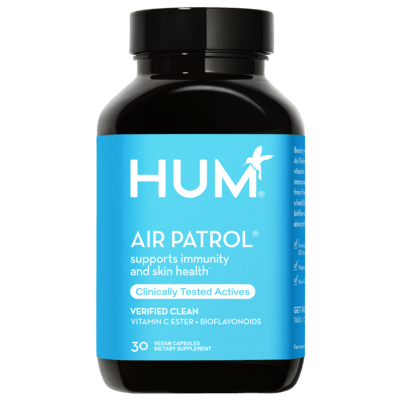Does Vitamin C Really Boost Your Immune System?
By Jessica Bippen, MS, RD •
March 9, 2020
Jessica Bippen, MS, RD, breaks down everything you need to know about vitamin C: the benefits, correct dosage, how to choose a supplement, and if vitamin C really boosts your immune system.
Feeling under the weather? Or maybe you’re surrounded by coughing and sneezing co-workers. No matter the situation, when cold and flu season hits, your immune system could use a boost. You’re probably reaching for a glass of orange juice or searching for the best vitamin C supplement as one of your natural remedies. But does loading up on this antioxidant really help prevent you from catching a nasty cold? Let’s find out.

What is vitamin c?
Vitamin C, aka ascorbic acid, is a water-soluble vitamin that acts as an antioxidant in the body. You’re most likely familiar with its well-known role in supporting your immune system. However, vitamin C also has numerous other important functions in the body.how Vitamin C Boosts your immune system
Vitamin C may boost your immune system by strengthening your skin’s defense system, allowing white blood cells to function more effectively, and helping wounds heal faster. It’s a common misconception that vitamin C prevents the common cold. That being said, even though vitamin C may not keep you from catching a cold, it may reduce its severity. Research shows that show up to 600 to 800 milligrams of vitamin C may decrease the severity and length of cold symptoms. The strongest effects of vitamin C occur in people whose immune systems are weakened due to stress. Most research in this niche focuses on athletes undergoing constant physical duress. Still, other forms of stress applicable to all include constant worrying, excessive alcohol consumption, smoking, and exposure to pollutants. Vitamin C works constantly to counteract the negative effects of stress on the body, making it one of the most sensitive nutrients to stress.
OTHER Vitamin C Benefits
Supports Collagen Production
Research shows vitamin C is essential for the growth, development, and repair of tissue all over the body, including collagen. As we age, collagen production slows and the rate of collagen loss increases. This shows up as a loss of skin elasticity and firmness and an increase in fine lines. Vitamin C plays an essential role in helping maintain and promote healthy collagen levels in the skin and body. In addition to supporting collagen production, vitamin C helps heal wounds, increases iron absorption, and plays a role in how your immune system functions.Combats Free Radicals + Pollutants
As an antioxidant, vitamin C fights free radicals in the body which may promote healthy aging and decrease your risk of other health conditions. It also plays a role in protecting the body from toxic chemicals and pollutants like cigarette smoke.Vitamin C Dosage
Your body can’t produce vitamin C, which means it has to come from the foods you eat. Thus, it’s essential to consume vitamin C daily to promote optimal health and well-being. For adults, the Recommended Daily Allowance (RDA) for vitamin C is 90 milligrams for adult men and 75 milligrams for adult women. The good news? Many fruits and vegetables contain vitamin C. Excellent sources include citrus fruits, tomatoes, potatoes, berries, bell peppers, broccoli, Brussels sprouts, broccoli, and kiwi. But what if you’re looking for an immune boost? Is taking more vitamin C better? Most research supports 500 milligrams of supplemental vitamin C to boost immune function and promote additional benefits regarding wound healing and other health conditions.can you take too much?
While vitamin C isn’t toxic, the uppermost limit is set at 2,000 milligrams daily. The most common complaints at higher doses include gastrointestinal issues such as diarrhea, as well as nausea and abdominal cramps. Therefore, the Natural Medicines Comprehensive Database considers vitamin C as safe when taken at/below this daily dosage and in conjunction with dietary sources like fresh fruits and vegetables. On the flip side, while relatively rare, extreme vitamin C deficiency can lead to scurvy. This condition is characterized by weakness, anemia, bruising, bleeding, and loose teeth.what to look for in a Vitamin C supplement
If you’re looking for an extra boost to complement your healthy eating plan, the best vitamin C supplement will contain esterified vitamin C. This type of vitamin C binds ascorbic acid to fatty acids in order to enhance absorption. Yet before supplementing, you want to aim for at least five servings of fruits and vegetables per day. If this suggestion doesn’t fully meet your vitamin C needs, it at least gives you a solid start!More like this









